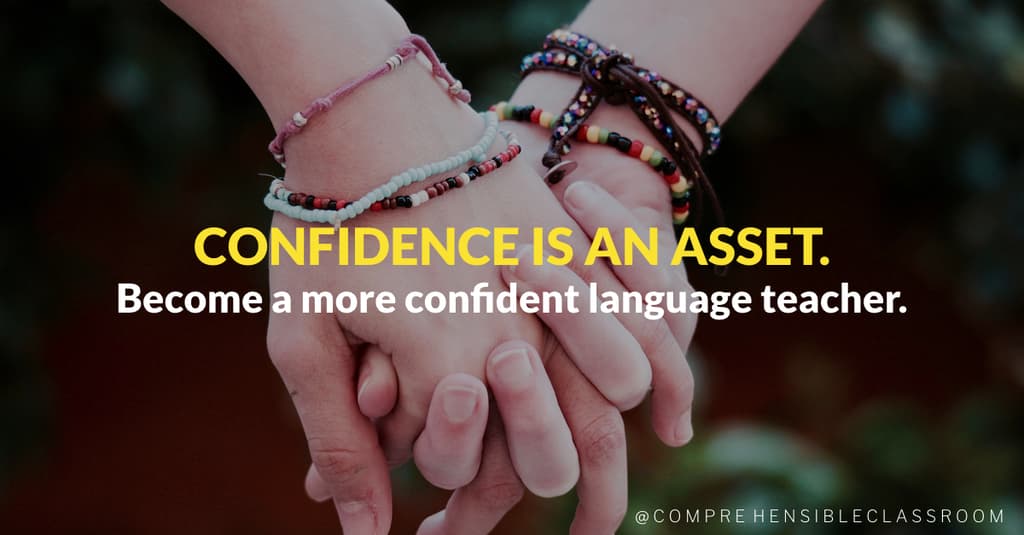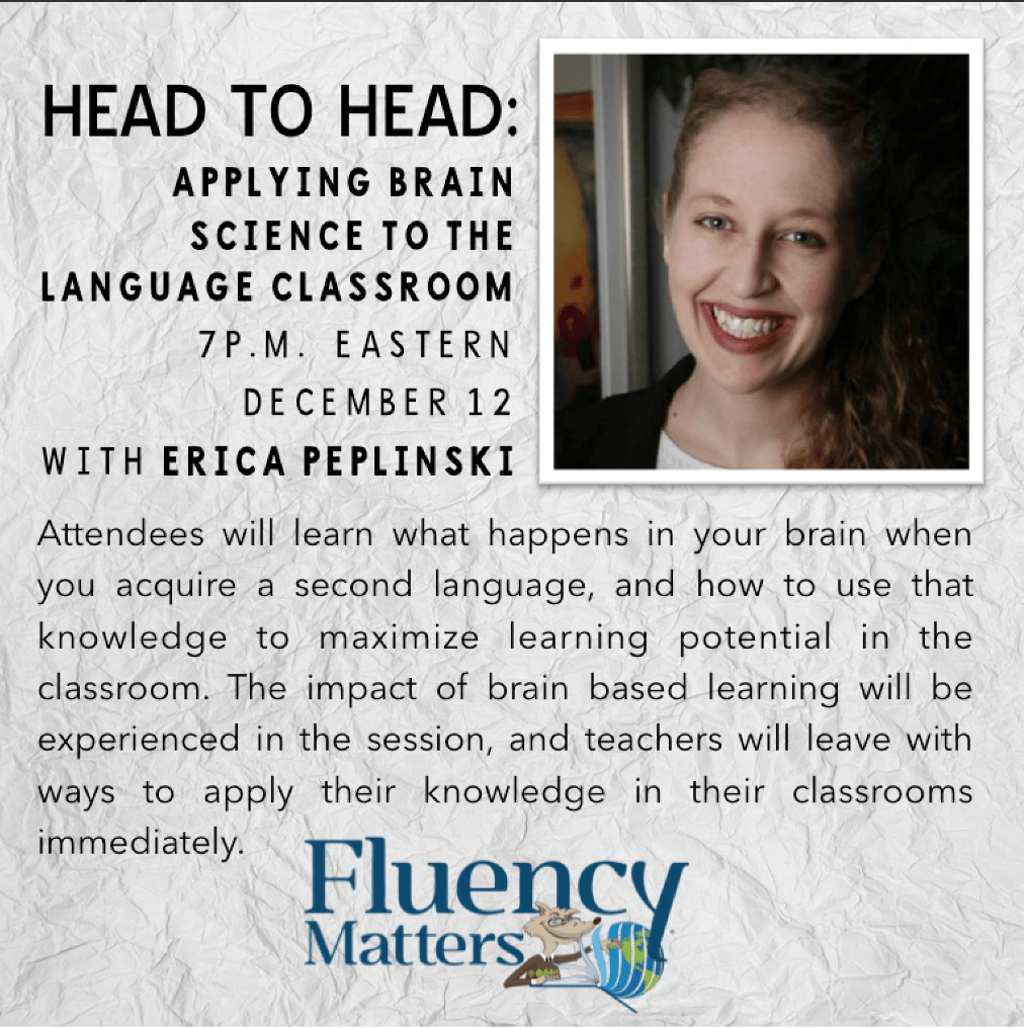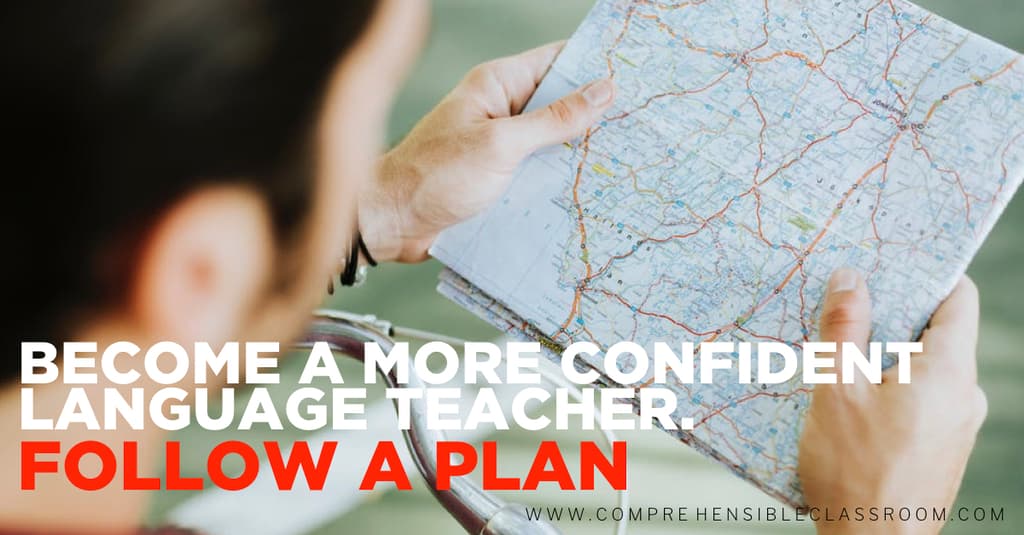Many teachers long to make instructional changes in their classes, but longing only sometimes leads to action. Even after identifying the change they want to make, determining that it will be best for them and for their students, and learning how to implement it, many teachers still remain paralyzed; trapped in their old, no longer wanted teaching habits from yesteryear.
What is the single most important factor in determining whether a teacher will actually do what they long to do?
CONFIDENCE

It is CONFIDENCE that will allow a teacher to take the leap from intention to action. Certainly, a teacher must be confident that what they want to do is the right thing to do; but this is not the most needed kind of confidence. In order to make a change–to try something new–a teacher must be reasonably confident that they are capable: that they are capable of making the change, carrying out the activity, presenting the lesson. And more important still, a teacher does not need to be confident that their first attempt will be a success; a teacher must be confident that even if they try and fail, they will live to try again.
Confidence breeds confidence
This past December, I learned another way that confidence impacts our practice when I attended Erica Peplinski's Head to Head webinar through Fluency Matters.
 Watch the recording of this presentation on the Fluency Matters training site!
Watch the recording of this presentation on the Fluency Matters training site!
In her presentation, Erica described how an understanding of Mirror Neurons can impact our teaching practice. Mirror Neurons are cells located in the brain that fire both when we do something and when we see someone else do something. When you smile, your Mirror Neurons fire. When someone else smiles at you, your Mirror Neurons fire. Mirror Neurons create the possibility for empathy!
Erica described several implications of Mirror Neurons as they relate to language teaching. As it pertains to CONFIDENCE, think of this: when you walk into class feeling CONFIDENT (you have a plan for the day, even if it's an 'open' plan), your students mirror your confidence. They trust you! If you are excited to try something new, your students will feel that excitement along with you. You are destined to succeed!
On the flip side, when you walk into the classroom feeling uncertain, scared, doubtful, frustrated...those are the emotions that your students will mirror. Have you heard the expression, "They can smell your fear?" This is because of Mirror Neurons! For this reason, we must find ways to mitigate our fear; to unearth confidence from deep within us even as we try new things. We must learn how to step into uncharted territory with great boldness. If we can overcome our fear of the unknown, our students will follow us with eagerness.
My goal is to help YOU become a more confident language teacher, and I've got four concrete strategies to help you get there.

#1 Ride momentum
One of the best tricks I've learned for becoming more confident is to ride momentum. If you are looking to try something new or uncomfortable or hard, do it when you are feeling on top of the world! Use the momentum of previous success or of enthusiasm and positive energy to propel you into new success.
Is your recent time in the classroom ridden with frustration and failure? No success anywhere in recent history? Now is not the time to test the waters with a new activity. First, build up some momentum. But how?
Get the ball rolling with an old favorite.
If you want to try something new and scary this week, don't do it on Monday (unless you are still on an emotional high from something that happened over the weekend, like I am from meeting Morat by chance last week on the streets of Madrid YES THAT REALLY HAPPENED!!!!!).
[instagram url=https://www.instagram.com/p/BvC5nvDBGzM/ width=600]
On Monday, do something that your students LOVE. Play their favorite game, debut a new song, scare their pants off with a mind bending MovieTalk. Do something that makes you feel like you are the greatest language teacher in the world and that your students love you and that you can do no wrong.
On Tuesday, give yourself a pep talk. Remind yourself of how awesome you are and what a great class you had yesterday. Wear your favorite outfit and grab your favorite fru-fru drink on the drive in. High five your colleagues as you float down the hall and tell them about how awesome your morning is going. Then march into class, explain what you are going to do as if it is the greatest thing since sliced bread and you not only invented it but also won a James Beard Award for your friggin' delicious creation. Then do the new thing. You will have a much higher likelihood of success–and of feeling successful–when you begin class really, truly believing in yourself and believing that you are a powerhouse. If you believe it, your students might just believe it, too! Then, use the momentum from your best day ever to give you the confidence you need to try something new again tomorrow. Ride that momentum, baby!
Let someone else give you a push.
My FAVORITE way to create momentum, however, is to get empowered and excited at an immersive conference. There is NOTHING like locking yourself in a think-tank for multiple days along with hundreds of people that share a similar goal and leaders in the field. This July, I am heading to iFLT 2019 in St. Petersburg, Florida, and I hope that you will join me. I am passionate about this conference because it continues to grow me and stretch me. Each year, I leave with new insight and questions to explore in the year to come. The world may think we are crazy because of how much we geek out about language acquisition at conferences like this, but it is exactly the kind of infectiously positive environment that can get you rockin' and rollin' with momentum.
No matter where you are on your path to becoming the comprehension based, proficiency oriented language teacher that you want to be, this year's iFLT will give you the confidence you need to get there.
Pack your bags, bring your family to take language classes or leave them at home, and head to St. Petersburg, FL for iFLT 2019. (Ooh! But first you'd better register--iFLT has sold out early for the last 5 years!)
Here are some ways that attending iFLT will boost your confidence:
Belong to a crew.
Cohort-style training each afternoon will give participants the opportunity to work in a more intimate setting with other like-minded educators who are at a similar place in their CI journey. Each cohort will be led by master teachers that are also experienced trainers. EVERY attendee will belong to a cohort, who we hope will become your biggest cheerleaders! The Cohort model means that even if you come to the conference alone, you will not experience it alone. You have a crew waiting there for you!
Be confident that the changes you are making are good changes.
ACTFL leadership is joining us at iFLT this year, and I could not be more excited. This will allow attendees an unprecedented opportunity to form a vision for a comprehension based, proficiency oriented classroom. One roadblock that teachers sometimes face is articulating how the changes that they are making in the classroom align with national standards. This is your chance to find out!
Additionally, ACTFL will be facilitating a one-day optional conference extension that introduces the ACTFL rating scale, the structure of the Oral Proficiency Interview (OPI), and techniques of administering and rating the OPI, including its applications in the language classroom. Participants observe and conduct live practice interviews at Novice and Intermediate proficiency levels. For more detailed information about MOPI training, please visit ACTFL.
Practice teaching alongside mentors.
Teaching Labs are back!! This opportunity for experienced teachers is hands-down the most efficient and the safest way to hone their skills. Teaching lab participants must apply for this opportunity, and they will be placed in a classroom with real students as co-teachers with a teaching mentor. The mentor will provide a stress-free and positive environment in which the teaching lab participants can try new strategies, take risks and refine classroom practices.
Watch teachers really teaching.
There is no other conference that provides opportunities to watch live language classes. The conference is held at a school, and the host school works with Fluency Matters to offer classes to real students during the week of the conference. This means that you get to observe the nation’s top acquisition-driven instructors as they teach real students, ages 8 to 18, using proven comprehension-based approaches to facilitate acquisition. Know someone that wants to learn a new language? Register them for the classes and bring them with you to St. Pete!
Experience a range of teaching styles.
With 4+ days and 50+ presenters/coaches to learn from, you are sure to find someone with a style that resonates with you. Why does this matter? It will allow you to...

#2 Find someone to emulate
In her welcome address at iFLT 2018, I remember Carol Gaab talking about how the the teachers and trainers that you see at conferences or on social media are not superheroes. They were not born with some magical language teaching superpower that others don't have. They are teachers like you that have worked really, really hard–that are still working really hard.

When I suggest that you find someone to emulate, I am not suggesting that you find an idol to put on a pedestal or a superstar to compare yourself to, seeing how far you have to go to reach their level. Find a teacher that leads by example. It should be someone that works hard, that is a lifelong learner, and that lifts others up. A great mentor will empower you with the belief that your greatest success will come when you find out how to be uniquely you in the classroom.
I think about the way that Elicia Cárdenas encourages teachers in the SOMOS group, or the way that she describes how her practice has been impacted by Anna Gilcher and Rachelle Adams with Elevate Educational Consulting. I think about Dustin Williamson and Cécile Lainé coaching teachers at national conferences and creating and sharing incredible resources through their blogs and spheres of influence. I think about Grant Boulanger leading not just his state, but his region and teachers throughout the country. I think about Carrie Toth's relentless pursuit of new professional opportunities that equip her to create ever better resources for language teachers to use in connecting their students with our planet. I think about Alina Filipescu mesmerizing a room full of teachers, my toddlers, and my neighbors; captivating us and making us hang on her every word. These are teachers that are in the classroom every day and still make time to support others, and there are hundreds of them out there waiting to inspire you.
Watch your mentor in the classroom.
Whether your mentor is still a full-time teacher or not, look for opportunities to watch him or her teach. This might be in their real-life classroom, virtually via video footage, or in temporary settings like iFLT's language labs. Observing a teacher that you want to emulate will give you a fresh image in your mind that you can visualize and imitate as you step out in confidence to try out that same strategy in your own class. It might a specific activity or lesson, or it might be a strategy for content instruction or classroom management. It might be something that you had learned about before but just couldn't wrap your mind around until you saw it in action, or it might be something completely new that blows your mind with its simplicity.
My first mentor was Michele Whaley, and she continues to influence my practice even today. My first exposure to comprehension based teaching was in a classroom visit to Michele's Russian class at West High School in Anchorage, and over the years I have had the great honor of watching her teach young students, old students, teachers; friends and strangers; supporters and critics. Michele and I have incredibly different teacher personalities and instructional styles. And yet I still want to be Michele when I grow up, because even as I am typing this my eyes are welling up with tears as I visualize her with her students, eyes twinkling, body leaning in, and arms outstretched awaiting for their answer to the question that she just asked. Every time I get to watch Michele teach, I become a better teacher.
Use your mentor's models.
I didn't have the pleasure of watching Carol Gaab teach until I had already been learning from her for nearly a year. In fact, I didn't even know at the time that she was still in the classroom! I began emulating Carol not because of what I saw her doing in the classroom, but because she shared a vision for language teaching that seemed like a good fit for me. I could tell that we had the same passion for keeping class fresh and exciting, for teaching culture and other content in the target language, and for modeling values for our students that would help them to become forces for good in the world. Once I realized that she was the same kind of teacher that I was (similar personality, similar vision), I started seeking out opportunities to learn from her: attending webinars, reading published materials, watching videos, and eventually learning from her in person at conferences. Learning who Carol was as a language teacher helped me to form a concrete vision for who I wanted "Martina Bex: Spanish Teacher" to be.
As you are searching for the confidence to make a change in the classroom, look for PROLIFIC teacher-trainers, like Carol, that share your vision and perhaps personality or organizational style. Because I was able to attend her webinars, read her published materials, watch videos of her in the classroom, and eventually watch her present and teach in person, I was able very early on to form a pretty clear vision for what I wanted my practice to look like. Modeling my practice after hers gave me the confidence to make large-scale changes in the classroom as well as the confidence to tweak those big changes to eventually be comfortable–and confident-–being simply me.
Find someone to emulate that inspires you!

#3 Follow a plan
When I first made the switch away from the textbook and into the waters of comprehension based teaching, it was with little more than a hope and a prayer. At that time, there were very limited instructional resources available for comprehension based teaching, and fewer still that resonated with me personally. In the last five years, we have seen an explosion of resources for language teachers that want to move away from the textbook, and this is a good thing.
Following a plan that someone else has written can give you the confidence you need to make a change that you desire. You can focus on the HOW (the skills) without having to dedicate much mental space to the WHAT (the content, the activities).
What I've found over the years is that teachers that are new to Comprehension Based teaching and choose to use a curriculum follow it to the letter. It is their lifeline.
Similar to how cooking with a recipe allows you to try new foods with reasonable success, finding a curricular plan to follow will allow you to try out a new activity or approach that you can later adjust to your own tastes. Teachers that have already moved away from the textbook–as well as teachers that have been using a comprehension-based for a few years–convert their lifeline into a vitamin. They have the confidence to use the materials in the curriculum to realize their unique vision for language teaching, but they no longer need it for life support day in and day out.
Try a new activity with Step by Step instructions
I gained the confidence that I needed to try a TPRS lesson by watching Blaine Ray ask a story in a recorded session from a past NTPRS and then reading a step by step guide by Susie Gross. In the months that followed, I scoured Ben Slavic's blog for specific lessons described by other teachers that I could recreate in my own classroom.
Here are some free lesson plans that you can follow to try an activity for the first time:
- Do a modified MovieTalk for Wildebeest.
- Play Mafia with beginners using scripts.
- Ask a story and follow it up with a reading.
- Turn a song into a source for comprehensible input.
- Read a novel with your class.
- Try out BreakoutEDU.
- Talk about current events.
- Approach grammar in context with a horizontal conjugation.
- Play [ST]RIP BINGO.
- Conduct Special Person interviews (French or Spanish)
Follow a curriculum to give yourself singular focus
If you are looking to make larger scale changes (more than just trying out an activity here or there) to move toward Acquisition Driven Instruction, I recommend finding a curriculum that you can follow. Once you have a curriculum that will keep you moving in the general direction that you want to go, you can feel free to stray from it and wander back as you gain ever more confidence. Another benefit of following a curriculum is that it will walk you through new activities and strategies. Teachers using SOMOS, for example, find that the activities used in each unit can be easily adapted to fit other content, which means that they are adding more tools to their tool belts as well as growing their confidence.
Here are some comprehension-based curricula to consider purchasing:
- SOMOS (limited availability in French) / The Comprehensible Classroom
- Cuéntame series (print and interactive e-courses; Spanish, French, German) / Fluency Matters
- Immediate Immersion (Spanish, French, German) / Teach for June
- Teaching Spanish/French through Comprehensible Input / Adriana Ramírez
- Sabine und Michael (German, French, Spanish)
- Look! I can talk! (German, French, Spanish, English) / TPRS Books
- A Natural Approach to the Year / Ben Slavic & Tina Hargaden
- Había una vez (Elementary Spanish) / The Storyteller's Corner
- Waltmania (Spanish, limited English) / Jalen Waltman
- Zhongwen Bu Mafan! (Chinese) / Terry Waltz
#4 Find your people
The last suggestion that I have for you to to become more confident is to find your people. Specifically, find your teacher people. Find a group of teachers that will support you no matter what. A teacher crew is not exclusive; it's an open group of people that come together with shared values. It is a group of teachers that understands the unique challenges that you face as a language teacher. They may or may not teach the same level and language that you do, and they may or may not be in a similar school setting. Their specific teaching situation matters less; the greater thing is that they (1) understand the responsibilities of and challenges faced by teachers generally and language teachers specifically and (2) share a similar vision for language teaching so that they can encourage you in the direction that you want to go.
Your people multiply your joy.
Your teacher people will make your successes that much sweeter. When you have a triumph in the classroom, share it with your people! Their enthusiasm will bring a smile to your face and a spring to your step and it will help others in your group to find the confidence to try the lesson, activity, or strategy that worked for you. Share your successes with your people to share your joy! When a success is shared in a group of people with shared experiences and a shared vision, it creates momentum for everyone in the group. And momentum–as we know–creates CONFIDENCE!
Your people offer solidarity and help in failure.
Whether an experiment goes awry or an existing, negative circumstance continues to down spiral, your teacher tribe will carry you through, helping you to live to teach again. Presenting it to your group allows you to draw from their collective experience to find solutions as well as to keep you from blaming yourself for the failure. If you are struggling with something, chances are that someone else in your group is experiencing the same challenge. A good teacher group is positive, supportive, and solution-oriented. Look for teacher people that help you to focus on what is going well, to take care of your personal well-being, and to identify practical steps to take along your personal path to becoming the teacher that you want to be. Find a group of teacher people that will help you #failforward.
Join a teacher group (or several!)
Here are a few of the most active teacher groups that I am aware of. Please share the link to your favorite teacher group in the comments!
- The SOMOS Facebook group
- iFLT Cohorts (see description under #1 above!)
- The #Langchat community on Twitter
- Ben Slavic's PLC
- CI Liftoff
- Local PLCs like Indiana TCI, Central Ohio TCI, or Tristate TCI
What gives you confidence?
They say you can't teach confidence, but I'm confident ;-) that you can create it. You've got my four strategies; I want to hear what has worked for you!





